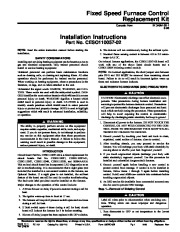| Categories | Carrier HVAC Manuals, HVAC Heating Ventilating Air Conditioning Manuals |
|---|---|
| Tags | Carrier 58DHC |
| Download File |
|
| Language | English |
| Product Brand | Support Phone Number: In North America, please call 1-800-CARRIER for immediate customer assistance from 8:00a -5:00p (EST) weekdays, Heating, Ventilating and Air Conditioning - HVAC |
| Document File Type | |
| Publisher | corp.carrier.com |
| Wikipedia's Page | Carrier Corporation |
| Copyright | Attribution Non-commercial |
Fixed Speed Furnace Control Replacement Kit Cancels: New IIK 349M-50-1 9-98 Installation Instructions Part No. CESO110057-02 NOTE: Read the entire instruction manual before starting the installation. SAFETY CONSIDERATIONS Installing and servicing heating equipment can be hazardous due to gas and electrical components. Only trained personnel should install or service heating equipment. Untrained personnel can perform basic maintenance functions such as cleaning coils, or cleaning and replacing filters.
Heating, Ventilating and Air Conditioning User Manual Free Download. HAVC Operator’s Manual. Gas Furnace and AC Free Instruction Manual Download PDF.
All other operations should be performed by trained service personnel. When working on heating equipment, observe precautions in the literature, on tags, and on labels attached to the unit. Understand the signal words DANGER, WARNING, and CAUTION. These words are used with the safety-alert symbol. DANGER identifies the most serious hazards which will result in severe personal injury or death. WARNING signifies a hazard which could result in personal injury or death. CAUTION is used to identify unsafe practices which would result in minor personal injury or product and property damage. NOTE is used to highlight suggestions which will result in enhanced installation, reliability, or operation. 6. The inducer will run continuously during the self-test cycle. 7. Nominal flame sensing current is between 4.0 to 5.0 microamps (uA) DC. On twinned furnace applications, the CESO110057-02 board will work with any of the above listed circuit boards and a CESO110005 twinning control module. NOTE: On twinned applications, the short jumper wire between pins ST-2 and 225 MUST be removed from remaining circuit board. Failure to do so will result in incorrect ignitor warm up times and nuisance furnace lockouts. ELECTROSTATIC DISCHARGE (ESD) PRECAUTIONS CAUTION: Electrostatic discharge can affect electronic components. Take precautions during furnace installation and servicing to protect the furnace electronic control. Precautions will prevent electrostatic discharges from personnel and hand tools which are held during the procedure. These precautions will help to avoid exposing the control to electrostatic discharge by discharging static electricity build-up to ground. 1. Disconnect all power to the furnace. DO NOT TOUCH THE CONTROL OR ANY WIRE CONNECTED TO THE CONTROL PRIOR TO DISCHARGING YOUR BODY’S ELECTROSTATIC CHARGE TO GROUND. 2. Ground yourself by touching your hand and tools to clean, unpainted, metal surface of furnace. close to control. 3. After touching chassis, you may proceed to service the furnace. You will recharge your body with static electricity by moving about or shuffle your feet. Reground yourself. 4. If you touch ungrounded objects (recharge your body with static electricity), reground yourself. Use this procedure for installed and uninstalled (ungrounded) furnaces. 5. Ground yourself again before handling a new control to protect control from damage. If control is to be installed in furnace, follow items 1 through 5 again before installing control. Put all used AND new controls into containers before touching ungrounded objects. 6. An ESD service kit (available from commercial sources) may also be used to prevent ESD damage. Step 1–Removal of Existing Control The ability to properly perform service on this equipment requires certain expertise, mechanical skills, tools, and equipment. If you do not possess these, do not attempt to perform any service on this equipment other than those procedures recommended in the User’s Manual. A failure to follow this warning could result in possible damage to this equipment, serious personal injury, or death.



